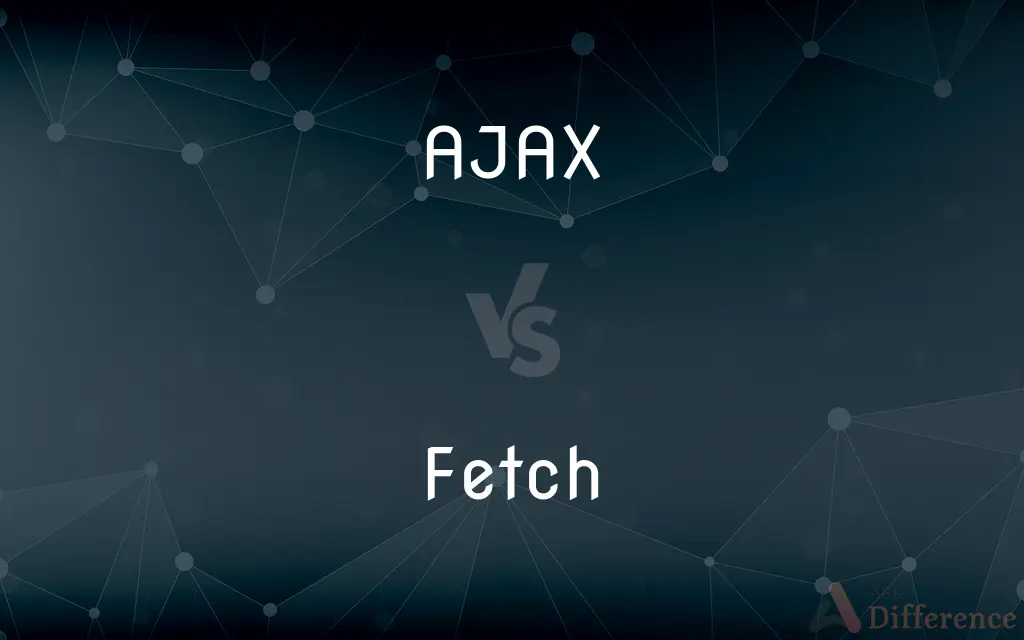AJAX vs. Fetch — What's the Difference?
By Tayyaba Rehman — Published on January 29, 2024
AJAX (Asynchronous JavaScript and XML) is a technique for creating dynamic web pages, while Fetch is a modern API in JavaScript for making network requests, offering a more powerful and flexible approach than AJAX.

Difference Between AJAX and Fetch
Table of Contents
ADVERTISEMENT
Key Differences
AJAX, standing for Asynchronous JavaScript and XML, is a set of web development techniques that allows web applications to send and retrieve data from a server asynchronously without interfering with the display and behavior of the existing page. It often uses the XMLHttpRequest object. Fetch is a newer web API that provides a more powerful and flexible way to make network requests. It returns promises and uses a cleaner, more modern syntax compared to AJAX.
One of the main differences between AJAX and Fetch is the way they handle requests and responses. AJAX uses the XMLHttpRequest object, which can be complex and cumbersome. Fetch, on the other hand, uses a simpler, promise-based syntax that makes it easier to manage asynchronous operations and handle errors.
AJAX has been widely used for years and is supported by all modern browsers. It's a part of the traditional web development toolkit. Fetch is a more recent addition to the JavaScript standard, offering a more streamlined and powerful approach to making network requests, but it might not be supported in some older browsers.
In terms of error handling, AJAX's approach is less straightforward compared to Fetch. Fetch provides a more consistent way to handle both network errors and server-side issues, making the code more readable and maintainable. Fetch also allows for easier integration with other modern JavaScript features like async/await.
Another key difference is in the syntax and usability. AJAX can be verbose and requires more setup, while Fetch provides a simpler and more concise syntax, leading to cleaner code. Fetch also natively supports JSON as a data format, making it more suitable for modern web applications that heavily use JSON.
ADVERTISEMENT
Comparison Chart
Core Technology
Uses XMLHttpRequest
Uses promises and window.fetch
Syntax and Usability
More complex and verbose
Simpler, cleaner, and modern
Error Handling
Less straightforward
More consistent and readable
Browser Compatibility
Supported in all modern browsers
Limited in older browsers
Data Format Support
Handles multiple formats
Natively supports JSON
Compare with Definitions
AJAX
AJAX requires more elaborate setup and error handling.
Setting up AJAX involves configuring XMLHttpRequest and handling responses.
Fetch
Fetch API provides a modern way to make network requests in JavaScript.
Fetch API simplifies pulling data from APIs in web applications.
AJAX
Uses XMLHttpRequest for server communication.
AJAX's use of XMLHttpRequest allows for detailed request configurations.
Fetch
Offers simpler syntax and cleaner code for requests.
Fetch allows for cleaner code with its streamlined syntax.
AJAX
Can handle different data formats including XML and JSON.
AJAX efficiently processes XML data returned from the server.
Fetch
Uses promises for easier asynchronous operations.
Fetch's promise-based structure makes async handling more intuitive.
AJAX
Integral in traditional dynamic web applications.
AJAX is a staple in many legacy web applications for dynamic data loading.
Fetch
Natively supports JSON, making it ideal for modern web development.
Fetch is widely used for JSON-based API interactions.
AJAX
AJAX enables asynchronous web requests without refreshing the page.
The site uses AJAX to load new content dynamically.
Fetch
Better error handling and integration with modern JS features.
Fetch integrates seamlessly with async/await for better flow control.
Common Curiosities
Do I need to refactor my AJAX code to Fetch?
It's not mandatory, but refactoring to Fetch can simplify and modernize your code.
What is AJAX primarily used for?
AJAX is used for making asynchronous requests in web applications.
Is Fetch supported in all browsers?
Fetch is supported in most modern browsers, but compatibility issues may arise in older browsers.
Can AJAX handle JSON data?
Yes, AJAX can handle JSON, but it's less straightforward than with Fetch.
How does Fetch improve upon AJAX?
Fetch offers a simpler, more modern syntax and better error handling.
Can Fetch return data formats other than JSON?
Yes, Fetch can handle various data formats, though it natively supports JSON.
Can Fetch be used with older JavaScript frameworks?
Yes, Fetch can be used with most JavaScript frameworks.
Is Fetch part of the JavaScript standard?
Yes, Fetch is a standard part of modern JavaScript.
Do I need a polyfill for Fetch in older browsers?
Yes, a polyfill is needed for Fetch to work in older browsers.
Does Fetch work with async/await?
Yes, Fetch works seamlessly with async/await for asynchronous operations.
Is error handling easier with Fetch?
Yes, Fetch provides more consistent and easier error handling.
Are there situations where AJAX is preferred over Fetch?
AJAX might be preferred for legacy system compatibility or specific XML handling.
Can I cancel a request with Fetch?
Fetch API does not natively support request cancellation, unlike some AJAX libraries.
Is AJAX still relevant with the advent of Fetch?
AJAX is still relevant, especially in systems where Fetch is not supported or for specific use cases.
Is learning Fetch worthwhile for new developers?
Yes, Fetch is an important tool for modern web development and is recommended for new developers to learn.
Share Your Discovery

Previous Comparison
Special Education vs. Integrated Education
Next Comparison
Broiler Chicken vs. Roaster ChickenAuthor Spotlight
Written by
Tayyaba RehmanTayyaba Rehman is a distinguished writer, currently serving as a primary contributor to askdifference.com. As a researcher in semantics and etymology, Tayyaba's passion for the complexity of languages and their distinctions has found a perfect home on the platform. Tayyaba delves into the intricacies of language, distinguishing between commonly confused words and phrases, thereby providing clarity for readers worldwide.
















































